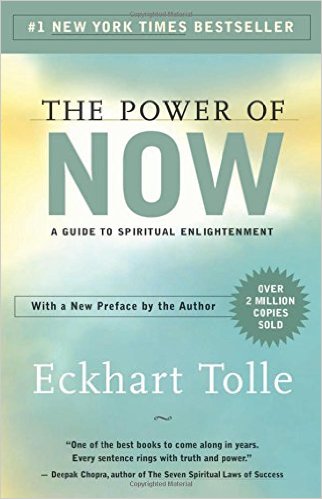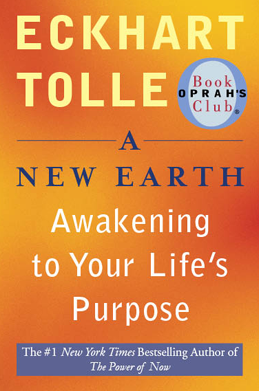|
Word Gems
exploring self-realization, sacred personhood, and full humanity
Editor's 1-Minute Essay:
Certainty
return to "Certainty" main-page
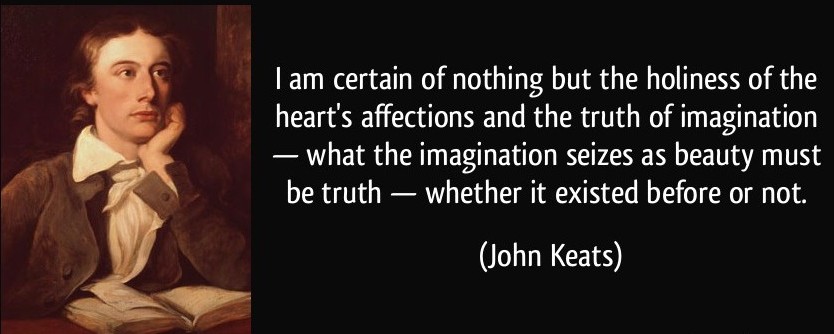
The great idea of Certainty has troubled sages and commoners for thousands of years: How to find Certainty in an uncertain world?
Certainty is more or less near-kin to other concepts such as Belief and Knowledge versus Opinion and Truth; but also related to “illegitimate” family members such as Dogmatism and Cultism.
There are many who contend that Certainty is unattainable in our world. A Jewish friend likes to quip about Jewish rabbis or lawyers who, if two of them debate, “will have three opinions.” Similarly, a favorite lecture series of mine, Oxford’s Dr. Daniel Robinson’s survey of the history of philosophy, reveals a long chain of conversation over 2500 years among notable thinkers disagreeing with, and contradicting, each other on virtually every topic.
the problem of Certainty
A general consensus among the highly educated suggests that notions of certainty will be found only among mentally infirm, children, and religious dogmatists.
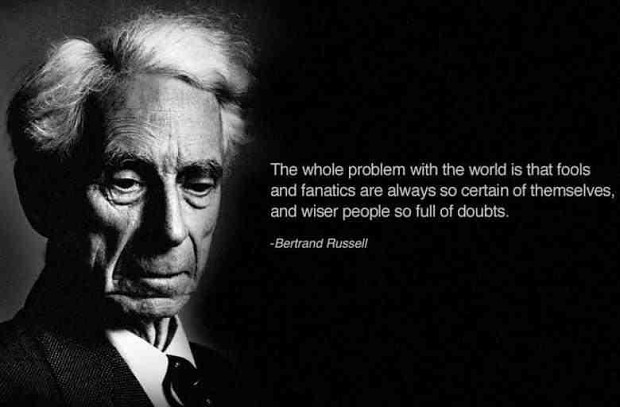
I'm a fan of Bertrand Russell and, in the main, here, he is correct; however, his certainty about lack of certainty is vulnerable to attack from another direction.
icon #80
"Certainty" takes its place as icon #80 on the roster of homepage topics. It's a big subject; but there's one main point I'd like to emphasize. It's really important and that's why I decided to feature it on its own page. I'll try to make this clear and share with you what I've learned.
a misunderstanding of the central issue
Many notable thinkers, such as Bertrand Russell, Voltaire, H.L. Mencken, Hume, and so many others, lampoon the idea of the mind ever gaining complete knowledge on anything; therefore, absolute certainty, as a function of the brain's knowledge acquisition, shall ever tantalize us as a brass ring well beyond our reach. Nobel laureate, Dr. Richard Feynman, one of history's great scientists, states the case:
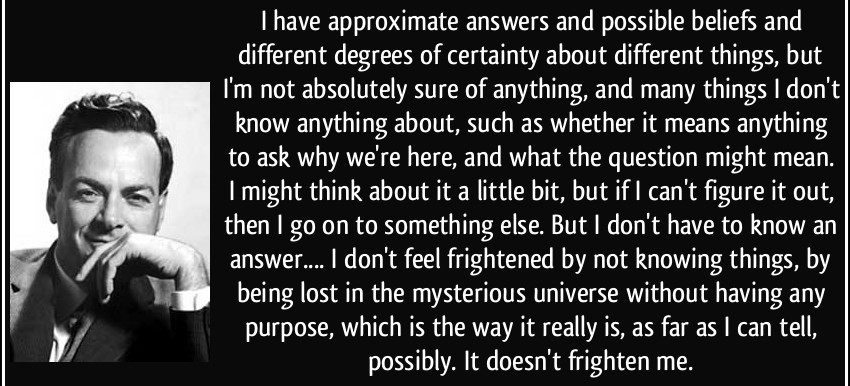
Dr. Feynman offers the rational and reasonable approach to the problem of Certainty. I said the same in my essay, "Stars And Midnight Blue," offering many examples of how the five senses deceive us - begging the question, do we ever get anything right? How would we know?
However, acknowledging all this, as the educated mind must do, many of the great thinkers have not understood that the scientific method is not the only avenue to our prize; and, in a larger sense, as I hope to present, science can never offer that highest level of Certainty to which we aspire.
seeking the aid of Immanuel Kant
I've enlisted the help of the short-of-stature professor from Königsberg -- but he was tall on the inside -- a few times in my writings and must do so again. I beg Kant's permission to slightly modify one of his famous phrases for our purposes here:
A sense of certainty, if it exists, might arise from cerebral activity but is not grounded in the efforts of the brain.
What does this mean for us? It means that a proper view of Certainty will, admittedly, have its element of mind-work, but the deeper foundations of Certainty are not built upon mind-power but something far more potent. We must look to the mystical, the realm of the soul.
And this is what so many of the more recent thinkers have not considered.
Certainty cannot be found on the level on the mind
I think it was Einstein who said that some problems cannot be solved on the level at which they were created. The problem of pandemic doubt, of seeing lack and insubstantiality everywhere, even when we obtain what we want, is a systemic difficulty, a "structural" defect, of the dysfunctional ego.
the search for Certainty in mathematics
But what about mathematical certainty? It's a favorite refuge of intellectuals who like to proclaim, "Nothing is certain in this world except for math equations." I have a few different answers for this.
|
'At its deepest level, reality is mathematical in nature.'
Pythagoras (quoted by Plato)
Carl Friedrich Gauss, considered to be one of history’s greatest mathematicians, in a 1799 letter to a colleague, Bolyai (senior), expressed misgivings concerning Euclidian geometry. Bolyai had reported that his work put Euclid’s geometry on sure footing. Gauss demurred:
“I am sorry that I didn’t use our former close proximity [when they were students together] to learn more about your work on the first principles of geometry; I would surely have spared myself considerable wasted effort and have become more tranquil, insofar as this is possible for someone like me when there is so much to be desired in this [geometry] situation. I myself have moved far ahead in my work on this… the path that I have hammered out does not so much lead to the goal [of certitude based on the work of Euclid] that one hopes for, and which you [purport to] have secured, but much more it makes the truth of geometry dubious. To be sure, I have found much that would qualify as a [popularly accepted] proof for most [suggesting that Euclidean geometry is correct], but which in my eyes really proves NOTHING.”
Gauss wrote on the eve of the creation of non-Euclidean geometry, with its two main branches, the hyperbolic and elliptic.
But why did the world need a new geometry? Did not Euclid have the last word on formal mathematical proof? He offered closely-reasoned argumentation based on postulates and axioms leading us to rock-solid answers concerning mathematical truism. Or not.
Gauss was one of the first to raise his hand in objection; and then, soon, a flood of others would join the chorus. Euclid’s geometry stood Gibraltar-like, a pillar of Certainty for 2000 years, until a few smart-alecs brought it down. Here’s the problem with traditional geometry that we knew and loved in high school: it works just wonderfully, if you happen to live in Flatland, a 2-dimensional plane.
Editor's note: Actually, it seems that I grew up in Flatland, also known as North Dakota or, as poetically referenced by my neighbor, a "horizontal world." I like her term better. But also see what Vincent van Gogh had to say about this.
Euclid seems to have ignored that our world is a sphere (of which, assuredly, he was aware) and, moreover, is situated in curved space. What does this mean? It means that, in an absolute sense, Euclid's five major postulates imperfectly represent reality. There is no such thing as a straight line or triangles with 180 degrees in the 3-D world. These are features of Flatland, not Sphereland.
Well, let me take it back, in part. Euclid's handy little postulates work just fine when finest precision is not required (as a long-ago university friend, a former Navy-guy, would say, "close enough for government work"). After all, geometry, which means to "measure the earth," built the ancient world. It was created thousands of years ago by people wanting to measure crop-fields, survey foundations for buildings, calculate distances and heights of pyramids, and it worked quite well for these mundane purposes. It still does today.
But let us not confuse the issue and quickly remind ourselves why we are having this discussion: there are some, like the dogmatists at church espousing "infallible doctrines," who preach that Certainty might be found in mathematics. I will impolitely suggest, look closer with a winnowing eye, and you'll see it all fall apart.
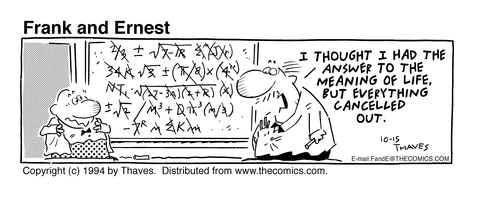
But what about math equations? It's said that some of the famous equations, developed even long ago, have been used to describe black-holes and other newly discovered phenomena of physics. Does this not take us to Certainty?
Two points I would make on this:
(1) An equation is like a balance-scale. Both sides are equal; that's what the word "equation" means. It's a tautology, an unartful repetition of information. It's like saying "All bachelors are unmarried men." There is nothing in the predicate that is not found in the subject. This is but truth by definition. So it is with all equations. For example, the simplest equation, "1+1=2," gives us two ways of speaking of a concept of number, in that, "2" is just another way of talking about "1+1." The "2" does not give us any new information. It's just more truth by definition. Kant, unimpressed, called this sort of knowledge production an "analytic proposition." Statements like "All triangles have three sides" do not greatly enhance our quest for knowledge.
Goethe: "Mathematics has the completely false reputation of yielding infallible conclusions. Its infallibility is nothing but identity [that is, "itself"]. Two times two is not four, but it is just two times two, and that is what we call four for short. But four is nothing new at all. And thus it goes on and on in its conclusions, except that in the higher formulas the identity fades out of sight."
Is an equation, or the "analytic proposition," an expression of certainty? Yes, but not "certainty" with an upper-case "C." It's just truth by definition. Nothing to get too excited about. As Goethe said, "four is nothing new at all." All this acknowledged,
(2) An equation can express a hidden truth of nature. Look at the masthead quote above: "At its deepest level, reality is mathematical in nature." I like this statement by Pythagoras, but even this could take us on a skewed path.
A portion of reality might take to itself symbolical form by means of mathematics because mathematics is a language, one that might help us express the patterns we see in the world around us. Pythagoras inspired a cult following with his efforts to reveal the inner-workings of Nature. He preached a "divinity" of number:
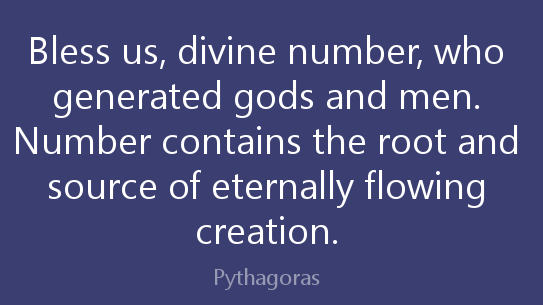
But this goes too far. Mathematics is a language, a mere signpost, allowing us to symbolically represent ineffable concepts of hidden reality.
Let's keep things straight, however. The utmost reality, the "thing in itself" -- ultimately, God's mind, Universal Consciousness -- is the "divine" component, not the signpost, not the language.
thoughts and ideas are the beginning, the undergirding, of theory, with the math added later to reflect and express the mind's work
Einstein: “Books on physics are full of complicated mathematical formulae. But thoughts and ideas, not [mathematical] formulae, are the beginning of every physical theory. The ideas must later take on mathematical form…”
An equation may be elegant, and it may represent a wonder of nature, but the equation is far less wonderful than the natural phenomenon itself. Why should this be difficult to understand, and why do some insist that the language of mathematics somehow becomes the repository of Certainty? This is a nonsense of misplacement, misemphasis.
Eckhart Tolle reminds us of a Buddhist proverb: "The finger that points to the Moon is not the Moon." Is it not strange that a proverb would need to exist reminding us of that which should be patently obvious? But it seems that this is a common slip of logic.
"Worshipping a signpost" takes us in the wrong direction. We find a similar error in another branch of cultism, Big Religion, which would have us revere "a printed page as the word of God," mere symbolism, as opposed to the true word of God which whispers to us deep within our spirits. A very big difference.
Materialists in both mathematics and religion attempt to produce an illusion of Certainty via a purported "sacred" language - but there is no such thing as "divinity" of number nor a "holy" book. Both of these illegitimate concepts have been commandeered to create perceptions of "infallible" Certainty - but only those who know nothing of Certainty would promote such error.
This color-photo of strawberry cheesecake, we admit, is a little tempting, but it's best not to eat the menu, the symbol, confusing it for the meal - just a word of advice to those who mistake signposts for destinations.

|
|
Kurt Gödel: considered as great a thinker as Aristotle or Newton:
"I don't believe in empirical science. I only believe in a priori truth."
Editor's note: By "a priori truth" Godel meant "a sense of truth before, prior to, inductive reasoning, fact gathering, and the scientific method is applied"; in other words, he trusted in sacred intuition and creativity.
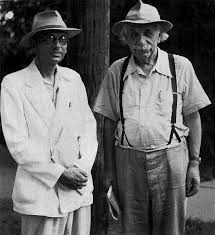
Kurt Gödel & Albert Einstein at Princeton, 1950s
Kurt Gödel & the Limits of Mathematics: The Incompleteness Theorem
Professor Mark Colyvan: "Gödel belongs in the company of Darwin, Newton, Einstein, Aristotle and the like... The Incompleteness Theorem is one of the truly revolutionary ideas of modern thought, absolutely monumental..." Gödel asserted that mathematics has blind spots, unproven "truths," unsubstantiated "axioms." His work would overthrow much of the "certainty" and dogmatism of mathematics of the kind often associated with cultish philosophies. See Dr. Colyvan's youtube lecture.
Bertrand Russell: “Pure mathematics consists entirely of assertions to the effect that, if such and such a proposition is true of anything, then such and such another proposition is true of that thing. It is essential not to discuss whether the first proposition is really true, and not to mention what the anything is, of which it is supposed to be true. [...] Thus mathematics may be defined as the subject in which we never know what we are talking about, nor whether what we are saying is true.”
Albert Einstein: "As far as the laws of mathematics refer to reality, they are not certain; and as far as they are certain, they do not refer to reality."
Editor’s note: The great teachers tell us that all truth is simple, easy to understand, once we see the essence of it. What is the essence of Godel’s “incompleteness theorem?” Very simplified, it is this: He offered, to the effect, a certain statement: “This statement cannot be proven using math.” Well, mathematicians, going back to the ancient Greeks, said everything in the universe can be modeled or proven by math. If what they say is true, then this should include Godel’s statement. So, if we say that, yes, math can be used to prove Godel’s assertion, “This statement cannot be proven using math,” then we have a contradiction. We say we can prove it, but the statement says we can’t. Therefore, at least in this one area, there’s a hole in the theory that math can explain everything. And this inconsistency brought down the entire edifice of math as the last word on defining and proving truth – because even one hole in the system means that there’s something wrong with the system, it doesn’t cover everything. It’s an incomplete view. And this is why Godel’s work is called the “incompleteness theorem.” What does all this mean? We don’t know for certain, for, to know would require all knowledge in the universe. My opinion here is that mathematics does a good job modeling some of nature, but, as far as a total view, that would require the mind of God, and good luck to us attempting to model that. And Godel’s theorem may be hinting at this lofty domain. (special note: Godel's statement has been used in some of the old Star Trek episodes to confuse a rogue computer with contradictions.)
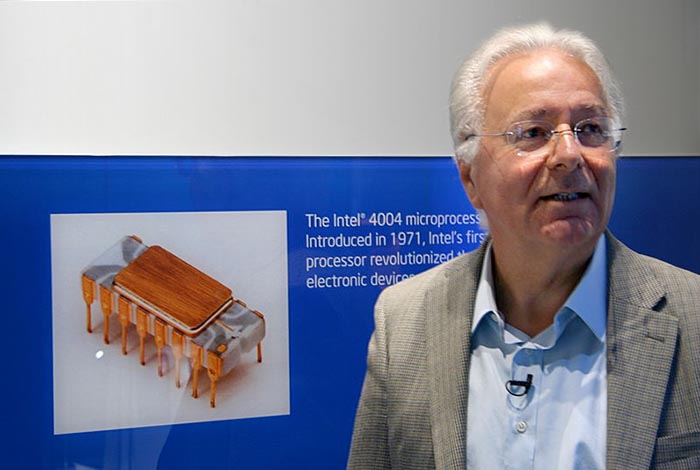
Frederico Faggin, inventor of the first silicon chip in 1971, speaks of Gödel's mathematics: "He showed that in an axiomatic system you can make statements that you can never prove that they are right or wrong, are neither true nor false, - so what does this mean? It means that they are both, that you can choose one or the other... it's telling us that the world is much richer than [we knew it] before... because there are things that are both true and false at the same time." [Dialetheism is the view that there can be a true statement whose negation is also true. Such statements are called "true contradictions", dialetheia, or nondualisms; compare Bohr's "complementarity"].
see the interview at 2:19
Editor’s note: The answer here to “both true and false”, I think, is that many issues before us should not be thought of in terms of “true or false” but only that of expressing the truth to various degrees. This error in thinking is similar to that of seeing the world as “good or evil.” As we’ve discussed there is no “evil” as such, but only degrees of sanity or insanity. Myopia does not see that everything is “good”, in the long term, as God produces only good. See the discussion on “suffering.” The “true or false” issue is aided greatly by Bohr’s complementarity principle.
|
|
Physicist Tom Campbell says that mathematics might well explain a scientific theory, but, even so, the theory could be all wrong.
He points out that, before the Copernican Revolution, scientists believed that the Earth was the center of the universe. This appeared to be true as the Sun, every day, seemingly crosses the sky. The stars, too, apparently orbit the Earth. Scientists of the day presented mathematics which “proved” with "certainty" that all astral bodies moved around the Earth. The math wasn’t elegant, in that, the concept of “epicycles” had to be invented, a “fudge factor,” to account for anomalies; but, with that in place and accepted as truth, the mathematics of the Ptolemaic System all worked out and was deemed to be solid. But, of course, there was one little problem -- the Geocentric model was illusion.
Mathematics is just a language which might express the essence of a scientific theory. But if the theory is wrong, the math might very well "correctly" express the error. Do you see the problem? - many do not. Consider Tom’s discussion in this video.
|
|
"In 1900 the great mathematician David Hilbert listed [Georg Cantor’s] Continuum Hypothesis as the most important unsolved problem in mathematics.
"In the 1920s Kurt Godel showed that you can never prove that the Continuum Hypothesis is false.
"Then, in the 1960s Paul J. Cohen showed that you can never prove that the Continuum Hypothesis is true.
"Taken together, these results mean that there are unanswerable questions in mathematics [which discipline] is considered to be the pinnacle of human reasoning. But we now know that even mathematics has its limitations."
Dennis Wildfogel
|
Editor's note: We will not find absolute Certainty in mathematics because mathematics offers but a model of the natural world, and that natural world, at its core, as we learn from quantum physicists, is managed by fields of probability -- not infallible rules of certainty.
we want existential Certainty
We have spoken of "certainty" with a lower-case "c" purportedly offered by mathematics and mere knowledge of the world.
But this is not the level of Certainty for which we seek. Information about the world is fine-and-dandy, but even what we think we know stands in jeopardy every moment pending some new discovery. Today's amazing scientific advancement is tomorrow's candidate for the science history museum: notions hopelessly out-of-date, like a buggy whip, to be smiled at as quaint.
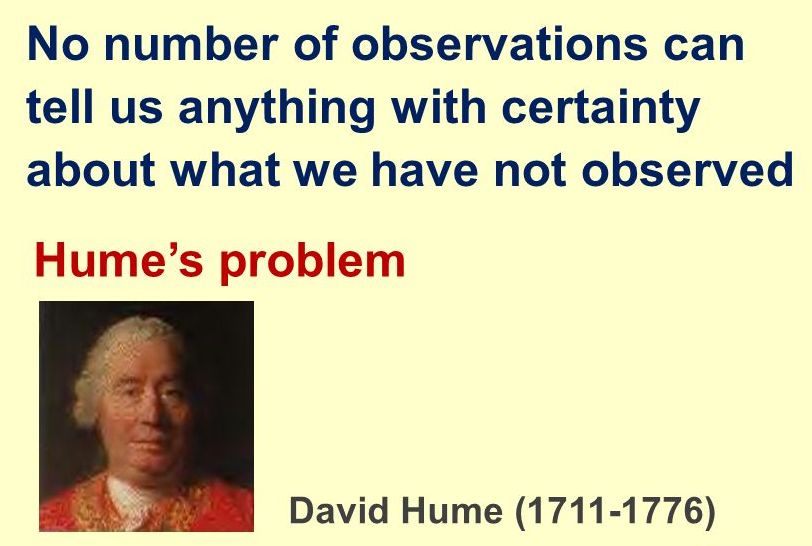
READ MORE on David Hume's "causation and induction"
All we need do to unsettle ourselves here is to listen to a Nobel laureate in physics, Dr. Richard Feynman, who ridicules even the terminology of "laws" of science. This is the kind of dogmatism we find in religion with its pompous view of "we are infallible, we know everything." How many "laws" of science have been sent packing, into the rubbish bin, by some upstart Newton or Bohr or Kant or Einstein with an impolite proposition that all previous work has been off kilter? Good luck to us if we think we'll find Certainty via the scientific method.
It is not the purpose of the scientific method to lead us into Certainty. That's not possible. There's a big universe out there, filled with all sorts of wonders waiting to be discovered, and this effort, offering the thrill of adventure and exploration, will occupy our attention for the next million years and beyond. Certainty about the material universe, however, shall always (or, at least, for a very long time) escape us.
People are not so worried about being "sure" concerning factoids of the world; it's fine when these might become available, but the absence of such is not what keeps us awake at night. What we really want to get our hands on is existential Certainty. We want to know, and know for sure, how we'll ever find meaning, purpose, love, and happiness for our lives. As the poet informs us, it's "what we stay alive for."
This level of Certainty will cost us a few dollars more; a math lesson will not take us to where we want to go.
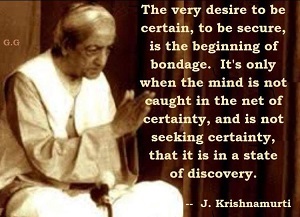
|
everything you’ve ever learned or heard or read or were taught is wrong
few things popular are true,
few things true are popular
Everything, including what Grandma said, or what your PhD research revealed, or what you learned from 40 years of experience, or what the Nice Young Man at Church preached to you -- it’s wrong.
Everything you’ve ever come to believe as true, as a fact of the world, is either patently wrong, wrong on its face, or effectively wrong, obsolete-wrong, in that, though an aspect of it might be true enough, as new information becomes available, it will find itself in a more expansive, more complex setting, thereby rendering what we thought to be a final answer as something childish, utterly incomplete, merely a subset of a much larger reality – to be cast aside as a few-years-old college textbook, for sale now in the bargain-book bin for 50 cents.
Newton’s “clockwork” universe seemed so authoritative that, in his day, it was taken as the very voice of God, with no major new discoveries in physics deemed to be possible. And his “laws of motion” were impressive and did take us to the Moon and back. However, today the Newtonian worldview has been relegated to status of mere subset of a larger system. This same paradigmatical diminution is currently afflicting Einsteinian explanations of the cosmos. It’s a big place out there with lots of knowledge to be discovered, and, at best, we perceive “one grain of sand.”
Editor’s note: Everything we think we know is defective because there’s too much to know; however, there’s another, more troubling, reason. In Kant’s Critique Of Pure Reason, he begins by lamenting the chaotic state of people’s thinking and philosophy at-large, creating mass error and confusion. See my extensive Editor’s note on the “Kant” page.
There is no fact of the world which shall escape this degradation. There is nothing that you can know about the world that can endure the onslaught, as Abraham Lincoln used the phrase, the “silent artillery” of new discovery, new research, new information. All “final answers” are swept away in this tidal wave of progress.
I said “fact of the world” and that which we may know “about the world.” All externals tumble and swirl and dance a death of obsolescence. What I say here is true in our world and also in the worlds to come. All knowledge, here and there, like a river’s torrent, moves inexorably forward.
But in this condition of perpetual change, motion, and evolution, there is one aspect of life to remain ever immutable. When you find love, the real love, it will plant a flag of permanence in your heart and being. Like an ember glowing, radiating, warming, it will live within you. Permanently. And though its initial visitation may have occurred decades ago, the warmth of that ember fades not, changes not. It will be there tomorrow, next year, and a million years from now, and beyond. Settled, abiding, imperishable.
Facts of the world, things to be known about the world, are derived intellectually. But love, true love, is apprehended as an altered and elevated state of consciousness. It is eternal as the soul; indeed, it lives as inherent aspect of the soul. Ultimate Reality itself might be defined by it.
Editor’s note: The foregoing observations of life are mine alone as fruit of my own meditations. Later, however, I realized that the apostle Paul had offered the same in I Corinthians 13. He spoke of a partial view of knowledge, and did so within the context of unremitting love.
|
the quest for existential Certainty
How do we obtain this Mount-Olympus kind of Certainty? It's not so easy; rather, it's so easy that most people won't do it.
In The Wedding Song, Kairissi and Elenchus discuss this question of coming to enlightenment, which would include perceptions of Certainty. Essentially, they conclude that this advanced level of awareness is not something one can earn merit badges for -- you can't just go out and work for it, and it sometimes comes to the "sinner" before the "saint."
Good advice, I think, on avenue of approach is offered by Eckhart Tolle, and you'll want to study his books, I would say, a little at a time over the coming years. I've done this to my benefit.
I can't give you "7 magic keys to becoming enlightened." No one can. I can't tell you exactly how to achieve that sense of existential Certainty of which we speak. What I can do is offer testimony that such experience is possible.
the most important point I would have you know about this subject
I think Eckhart, in an interview, did a good job explaining his own experience. He talked about how a transforming mystical event caused a dramatic reorientation of his life and thinking. He said it became a kind of knowing, something that was now part of you. He said it was like holding an apple in your hand, and you can see the apple and you know it's there, and if someone comes along and says "the apple isn't there," you would pay no mind as you know the apple's real. But, he said, even if a great spiritual teacher from the past, like the Buddha, came and said "the apple isn't there," Eckhart then provocatively asserted,
- "Well, that's interesting, now I know that even the Buddha can be wrong."
I thought this was humorous but exactly right on. We're talking about a level of Certainty that could never be taken from you. It's part of you, the deepest part. You might as well say that you could lose your own self as you might lose this sense of Certainty. It's not possible to doubt it.
the fruit of the purified consciousness
In the earliest-written book of the New Testament, Galatians (see my 15-year work on this document) the apostle Paul, in chapter one, spoke of things of which he was so certain that it didn't matter to him even if a blazing angel from heaven appeared to him and said the opposite - it wouldn't phase him. That's the kind of Certainty we're talking about, just like Eckhart's "Buddha."
And Paul frequently spoke of the "gifts" and the "fruit" of the "spirit." But Paul's message has been buried in archaic "church-talk." The "holy spirit" is better rendered "purified consciousness." When Paul speaks of a "word of knowledge" as gift or fruit, he means to say that there are some things that a spiritual mind will come to know mystically - not via the scientific method - as a function of an advanced level of awareness, the purified consciousness.
- An awareness of love, joy, peace - and, yes, Certainty, too - will simply be "dropped into your head," with no effort on your part. These "gifts" of awareness will now be yours, and you will know what you know, and no one can take from you what is yours and, now, part of you.
Certainty, with a capital "C," results from an awareness of one's linkage with "God as Singular Pervasive Reality." (Also see the discussion on this in The Wedding Song.)
Big Religion, with its caricature of this reality, tries to command people to "believe"; that is, they try to legislate Certainty. This program has not worked out so well for its participants; instead of Certainty, Big Religion's victims are burdened with fear, guilt, and doubt.
Carl Jung on the mystical event of Certainty
On the "Believe" page, and also in the Kairissi-Elenchus dialogues in The Wedding Song, I discuss Dr. Jung's monumental contribution to this area of finding wholeness and completeness.
While we cannot order, like a book from Amazon, the advent of enlightenment, when that mystical experience - which will include Certainty - comes for each of us, it will form the basis of our eternal sense of spirituality.
So shattering, jarring, and paradigm-shaking will it be for us that we shall never forget it. And when we leave this Earth with all of its suffering, we shall eventually allow our memories to dim and fade regarding our time of grief - but even a million years from now, we shall never forget that first moment of coming to Certainty of love, joy, and peace.
And this mammoth event for one's person will take center position in our memories, and we will come back to it, and come back to it, virtually daily, maybe, several times a day, for our eternal lives, as it will form the basis of our deepest convictions and our perceptions of God and Providential working in our lives.
More accurately, rather than finding ourselves repeatedly "coming back to it," we'll find it difficult to escape the wondrous "beatific vision," so taken and captured will be our sensibilities. We will live in it.
As I explain in The Wedding Song, as Kairissi and Elenchus discuss, this coming to awareness, this burst of light of entering "aliveness," will often take the form of Gibran's "first sight," the first meeting with one's sacred Beloved, one's eternal Twin Soul.
- The highest expression of Certainty lies ahead for us when, one day, at the right time, we shall perceive the Beloved's identity, a mystical "knowing," and this without equivocation, reservation, or shadow of doubt. As John Keats informs us, it is not possible to doubt after witnessing, being stunned into silence by, the beauty of her soul. Certainty, now, for the enchanted lover, will have a face and a melodious voice. She was "made in the image" and, therefore, wearing a mantle of the divine eternities, is well credentialed to introduce, to her only one, the long sought-for Certainty.
With this apex of Certainty, we shall have entered the eternal sacred marriage, as per the ancient prophecies, that cannot be "sundered."
A sacred marriage and love affair, for which separation is not possible nor desired, is Divinity's gift to us. The "purified consciousness" provides access to this Universal Intelligence, a level of Certainty which is God's own mind. And in this mind of "Singular Pervasive Reality" no darkness of doubt can exist.
The true lover never "doubts," that is, never sees "two" paths (which is the literal meaning of "doubt" as the root-word "duo" means "two"); for him, she is the only one, the Only One.

We shall not be surprised that the great English poet, in his ecstatic visions, is one of the few commentators on Certainty to eschew the materialistic view.
|
a deeper reason why the quest for Certainty, if egoically approached, quickly devolves to the pathological
In this article we’ve explored several indications that a materialistic quest for Certainty, one without grounding in a higher level of consciousness, will ever disappoint us: as we’ve said, there’s a big universe out there, filled with all manner of knowledge, and good luck to us to finally grasp it all.
But what of the quest itself? Granted that absolute answers may elude us, shouldn’t we be striving for closer and closer approximations of the truth? Isn’t this the reasonable and adventurous way to live?
I would say, yes, of course. And this is the spirit of progressiveness that will do us well as we make our way in our new lives in Summerland. All this is good. But let us beware of the wiles of the dysfunctional ego that might easily transform this good into something untoward.
In my own life, I’ve discovered that I’m the kind of person who likes to plan, even, very long-range planning. You will note in my articles that I’ve set some goals for myself in Summerland that might unfold over the next 100 or 200 years.
There’s nothing wrong or injurious in any of this; unless it’s motivated by the ego’s basic fear. Let’s recall that the psychological profile of the ego is one of “I don’t have enough” because “I am not enough.” A quest for Certainty goes wrong when it’s propelled by a terror of the future, by perceptions of lack and neediness. This kind of quest for Certainty is dysfunctional – producing what is popularly known as the “anal control-freak.”
Jiddu Krishnamurti, 04.Feb.1969: "One sees the mind is always demanding to be certain, to be secure, to be safe. A mind that is safe, secure, is a bourgeois mind, a shoddy mind. Yet that is what all of us want: to be completely safe. And psychologically there is no such thing... each person wants to be safe, secure. And yet psychologically he does everything to bring about his own destruction."
the Cloud Of Unknowing by Anonymous
Adrian mentioned a book, germane to our discussion here. “The Cloud Of Unknowing” by Anonymous is a fourteenth century writing, a work of Christian mysticism. Apparently it was produced by a cloistered monk. We don’t know his name; it seems that he saw no reason to supply this detail. His thesis suggests that the enlightened person will “be willing to be blind, and give up all longing to know the why and how, for knowing will be more of a hindrance than a help.”
Taken in the right spirit and context, this is good advice. While ignorance, per se, should never be lauded as a virtue, there is a sense in which the godly man and woman must surrender, in an attitude of faith and patience, to what is. Surrender here is particularly appropriate because some good things cannot be known in their entirety; moreover, some bad things have no solutions in this world but merely reflect the purpose of our coming to planet Earth. In other words, don't worry about it, we're not going to change the way business is done "down here in hell."
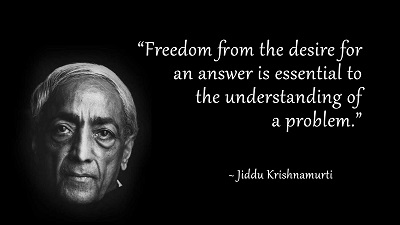
This should not mean, of course, that we are not to strive for the truth – as other instruction clearly mandates this sacred path of discovery – but, until greater light comes our way, there should be no frantic appeal, no temptation from the ego's “I don’t have enough” or “I am not enough.” Each day, each step along our way, if our spirits are well grounded, we will enjoy and accept life as it is; that is, until it changes, or until we can change it, into something more and new.
Eckhart Tolle offered a larger, very insightful, view of this process, this acceptance of “not knowing.” If we live fearfully as a “control freak,” desperately attempting to manufacture Certainty when none can possibly exist, we add darkness to our minds and hearts.
But it’s even worse than that. Universal Consciousness, Universal Intelligence, is directing all facets of the cosmos toward a prosperous and bountiful evolution. But if we live in a fearful and rigid frame of mind, how will we be able to discern and recognize the “still small voice” of God, of cosmic progression, how can we be led to higher ground, when it comes calling, asking us, persuading us, to change? If we've already married ourselves, sold ourselves, to some half-baked notion of Certainty, if we fancy ourselves already in possession of ultimate "infallible" truth -- which can never happen -- then we will miss out on, fail to receive, the mentoring "word of God" whispering to us.
|
|
'FIRE ... Certitude. Certitude. Feeling. Joy. Peace'
We are reminded of Pascal's use of the term "FIRE."
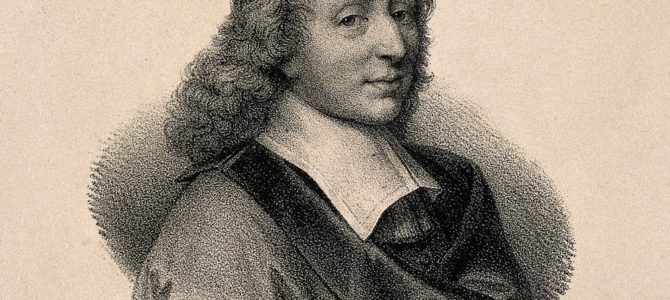
Philosopher, mathematician, scientist, Blaise Pascal, even as a young man, offered important scientific discoveries.
His life changed, however, at age 30, when he found himself in receipt of a shattering mystical experience. So jarring was this event that he wrote a summary of it, which he carried in his coat for the remainder of his life:
|
The year of grace 1654,
Monday, 23 November, feast of St. Clement, pope and martyr, and others in the martyrology. Vigil of St. Chrysogonus, martyr, and others. From about half past ten at night until about half past midnight,
FIRE.
GOD of Abraham, GOD of Isaac, GOD of Jacob not of the philosophers and of the learned. Certitude. Certitude. Feeling. Joy. Peace...
|
He characterizes this seminal incident as "FIRE" - we note the all caps; but then, giving rise to "Certainty" - stated twice; leading to ecstasy, joy, peace.
|
|
determining authenticity via the touchstone method
In times past, since the ancient Greek and Indus Valley civilizations, the authenticity of gold was affirmed by the touchstone test.

The metal in question would be used “touch” or draw upon an abrasive black siliceous stone. The resultant detritus would be compared to that of a sample of verified purity.
In other words, the genuineness of a tested precious metal would be determined by comparing it to a known and trusted standard.
what is our touchstone standard
Nearly 100% of the peoples of planet Earth are engaged in some form of cultism. This means that the average person does not think for him or herself but relies on, is led by, some external authority – be it in the political, religious, corporate, academic, or scientific-materialistic context.
Those who adopt belief-systems as an attempt to fill up the existential neediness within, the sense of “I don’t have enough” because “I am not enough,” will likely spend some time in “dark detention” upon crossing over. During this period of mandated solitude, one will be required to finally become an honest and thoughtful person, before moving on to the real world, the Summerland home world.
But if we cannot, or should not, rely on infallible gurus, any external authority as final word, to legislate our sense of morality, then how might we craft for ourselves a path to truth?
the internal resonance
We must go within. That’s where the touchstone is, our personal guidance system. That’s where the “true self,” the part of us linked to God, resides. And when we mentally compare any proposed action in life to the “made in the image” standard within, to the touchstone within, we will sense the authenticity and rightness, or lack thereof, concerning any debated course for ourselves.
Why is there an internal resonance with the truth? This is so because, as we’ve learned, the deeper sacred person is linked to God, to Universal Intelligence. It knows its own. The dysfunctional ego, nearer the surface of personality, enjoys no resonance with, can never obtain, a sense of certainty regarding what’s real.
See the lectures of Krishnamurti. He spent 60 years teaching on this subject.
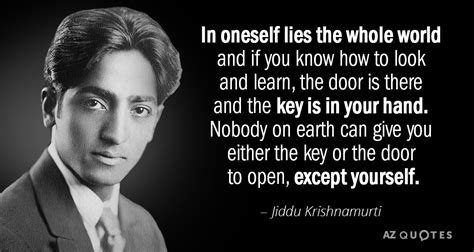
|
|
does a stone fall to the ground due to gravitational magnetic forces
As a young man, with my biblical studies at the time, I thrilled to certain realizations, sections of scripture which, it is clear to me even now, were inspired by the other side. One such opening panorama is found in the book of Proverbs. It employs a “mashal” style of teaching, implicit within such is the proposition that the world around us is not what it appears to be; surface meanings frequently offer a too-simplistic and skewed picture of reality. We have to go deeper.
In science, we often encounter this false reading of the apparently obvious: see my articles on "quantum mechanics" and the history of science. There are a great many of these illusions, for example, a most common one, the sun seemingly rising in the east. But here’s another.
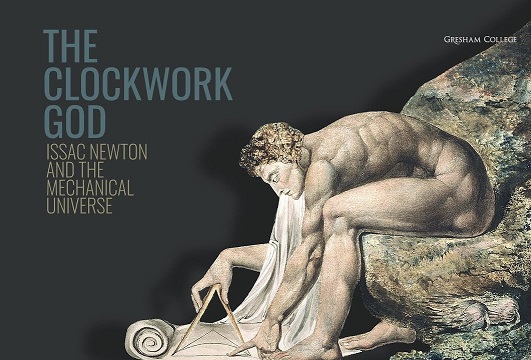
Isaac Newton’s discoveries about the interplay of force and matter rocked the world of the latter seventeenth century. His insights were considered to be so penetratingly perceptive that many considered his views to be the final voice of God on matters of science, with nothing more of import to be discovered.
But Newton, along with the common wisdom, was wrong. Here’s a classic example of how surface meanings can lead us astray:
is gravity a form of magnetism
Newton's "law of universal gravitation" seems to be a form of magnetism. It indicates that every particle in the universe attracts every other particle with a force that is directly proportional to the product of their masses and inversely proportional to the square of the distance between their centers.
The mathematical formula for this “works.” It very accurately predicts forces associated with this apparently magnetic gravitational attraction. It all “works” so well that it seemed to be the last word on the subject. Who could doubt it? – the math “works”!
it's all wonderful - except that, none of it is true
However, 250 years later, it was shown that there was a problem. None of it is true. Well, it’s true enough on the surface of reality. The math does “work,” and we can, in fact, predict the seeming gravitational forces between particles or planets or whatever. But what appears to be “magnetic forces” are nothing of the kind. The reality is, space itself, if it becomes “warped,” creates what seems to be “gravitational forces." Einstein’s 1915 General Theory pointed out the error.

There is no universal magnetism. There is no magnetic force creating what we call gravity. None of this is true. But, when you see a stone drop to the ground, it can certainly appear to be true; however, "surface" meanings can be quite deceiving. And the math “works,” as well.
However, even though the math can accurately predict what we once thought were “magnetic forces,” what the math is really demonstrating is not based on magnetic forces but something altogether different in kind.
the 'misinformation' attack
On the “deception” or “tyranny” pages, I present an inset-box which addresses today’s popular propaganda ploy by totalitarians, that of “misinformation.” This becomes excuse for Orwellian censorship, a stifling of debate, neo "book burning," concerning any idea which contradicts the totalitarian narrative. Think of the last time in history, in the twentieth century, that book-burning was considered right and proper, was given Dear Leader's approval.
The problem with the “misinformation” attack, apart from the fact that it’s anti-humanistic and draconian, is that there’s no way to tell if a statement is absolutely false. To do so would require a divine-like grasp of all facts of the universe, which the totalitarians, in their bloated arrogance, presume to possess.
Everyone needs to be allowed to speak, because, in an open forum of freely flowing ideas, we'll find out what's right and wrong - but not through a new Dark Age of "infallible" inquisition.
|
|
Editor's last word:
Elsewhere I have often referenced Big Religion's sins against reason with its inability, as Bertrand Russell well phrases the issue, to withhold judgment in the absence of evidence.
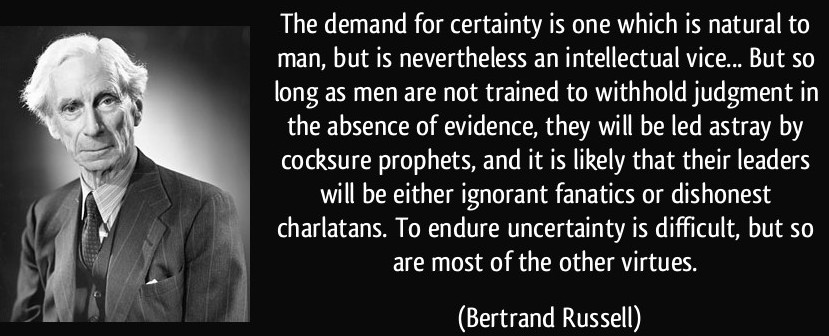
More needs to be said on this subject of cultish dogmatism, but I will refer you to my core articles.
As a young man, I happened upon a book -- The Myth Of Certainty by Daniel Taylor -- which would greatly aid my thinking, rousing me from "dogmatic slumbers," as Kant used the term. I would learn that so much of what passes for religious Certainty is but the fear of death in a mask. (See the discussion concerning this in the "Jesus" article.)
A final item worth mentioning: Many of the quotations featured on the "Certainty main-page" exude materialistic sentiment, with its most salient example, "Nothing is as certain as death" - a supremely ironical statement as its proponents mean to highlight the absurdity of ever finding something to be sure about. But they are wrong. Death is but an illusion, there is no death, as scientifically substantiated as the existence of the planet Mars, or anything else deemed to be commonplace in the natural world.
Let us take comfort in the channeled words of Rose Carson, "Two Years In Heaven," testimony to her still-mortal husband. Her report begins with:
"Beloved, I have been two years in the blest country that knows no doubt or sin. Oh, strange and wonderful life of the spirit that I have learned to know so well..."
Notice her Certainty. She now lives in a "country that knows no doubt." Far removed, for her, is our dystopian world where every good thing passes away, having exchanged it for a land where all pleasures are permanent and can be counted on.
Final note: I see a paradox. As we’ve discussed, we will find a sense of Certainty in terms of perceiving the rightness, the authenticity, of the Sacred Beloved when she comes: something deep inside of us will say, “she’s the one.” Further, from a larger perspective, we will experience a sense of Certainty, of permanence, of “having arrived,” with any of the soul’s virtues: peace, joy, agape love, and the like. The soul, the seat of Universal Consciousness and our link to it, lives in a timeless, unchanging world of the eternal present moment and admits to no degradation.
But, though we acknowledge all this, an anomaly might slip in the back door when the dysfunctional ego gets involved. For example, the ego’s fear-based mentality craves the Certainty of “finding itself,” of “knowing itself.” But this is not the healthy version of self-knowledge advocated by the seer at Delphi. This is the ego attempting to remove the terror of insubstantiality from its perception of self.
The problem is this: We can never know ourselves in any absolute sense. How could we? Our true self is linked to, merges with, Universal Consciousness, which, by its very nature, is unknowable, unfathomable, ever uncharted. As such, we can never know God in any absolute sense, and therefore the same will be true for that aspect of ourselves linked to God.
And so, even in our sacred quest for Certainty, we must also make friends, as per the "Cloud of Unknowing," with a certain degree of Uncertainty - because it shall ever be our companion in our eternal journeyings.
|
|










